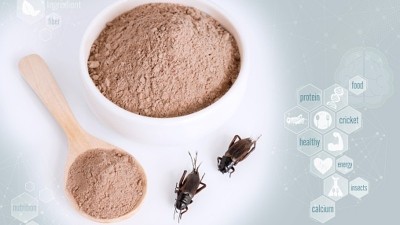Animal-free hits: The Top 10 APAC alternative protein stories in 2022

Sizing down to make it big: Ulu Hye revamps size of dairy-free mylk base jars amid retail push
World-first dairy-free mylk base creator Ulu Hye launched smaller versions of its products earlier this year in preparation for entry into major supermarkets as well as expansion to overseas markets.
Ulu Hye established an entirely new plant-based dairy category with the invention of its dairy-free mylk bases, made with nuts and seeds.
Having made its mark in the Australian market via health and bulk food stores as well as online platforms, the firm started working on entry to major supermarkets as well as exports, and launched new ‘Mini Mylk Bases’ which can be made into 3L of mylk in total.
“The mylk bases are actually a very complex product to create, so we started with just the 10L jars only because that gave us enough margin for operations,” Ulu Hye Co-Founder Heidi Peuten told FoodNavigator-Asia.
Big stride: Shiok Meats confirms 2023 commercial launch plans as cultivated shrimp reaches US$50/kg milestone
Cultivated seafood pioneer Shiok Meats revealed earlier this year that its production costs have dropped to the coveted US$50/kg milestone, bringing it even closer to realising its commercial launch plans by the end of 2023.
When we last discussed cultivated shrimp pricing with Shiok Meats’ Group Co-Founder and CEO Sandhya Sriram back in 2020, the price per kilogramme was hovering at around US$7,000 – demonstrating the enormous progress the firm has made over the last two years.
“This US$50/kg milestone is really a big milestone and a huge win for us compared to the US$10,000 or US$5,000 that we were at previously, it’s a huge update we’re very proud to be sharing with the industry,” Sriram told FoodNavigator-Asia.
Step-by-step: Hybrid products ‘steady strategy’ for alt protein industry to convert consumers - experts
Hybrid meat products comprising ‘real’ meat and plant-based meat have been hailed as one of the steadiest strategies available for the alternative protein industry to convert consumers, gain acceptance and maximise its reach in Asian markets.
Hybrid meat products could be a combination of plant-based protein with either conventional or cultured ‘real’ meat, and industry experts believe that ironically the presence of this ‘real’ meat in products could be what crucial to converting consumers to eventually reducing their consumption of traditionally-produced meat.
This is especially so in Asia, a region where meat is a very important part of local diets and considered by many cultures to be not only a status symbol but also critical to health functions, making a sudden switch or abrupt acceptance of 100% plant-based foods somewhat more difficult.
“Many foods in countries like Malaysia are centred around animal-based meats [and] it would be very difficult to get consumers to just give that up wholesale,” jackfruit-based meat firm NANKA Co-Founder Ahmad Syafik Jaafar told FoodNavigator-Asia.
Mighty mushroom: Mycoprotein touted as future of protein due to flavour, nutrition and sustainability credentials
Asia’s first mycoprotein technology firm Mycovation believes that its products are the true future of alternative protein, with the firm touting its flavour, nutrition and sustainability credentials.
Mycovation is based in both Singapore and India, and its business and research model is primarily centred around mycoprotein fermentation from mushroom mycelium to develop this as a viable alternative protein product.
According to the firm’s CEO Shiva Susarla, mycoprotein holds immense potential to emerge as a major player within the alternative protein industry because of its advantages in all the areas that are the most important to consumers, namely flavour, nutrition and sustainability.
“Currently, the entire plant based movement whether in alternative meat or alternative dairy is mainly anchored around three major sources: Pea, soy and wheat protein, and when it comes to using these to make meat or dairy analogues, all of these bring with them significant off notes, plant flavours are very difficult to mask,” Susarla told FoodNavigator-Asia.
‘Insects the new sushi’: Ÿnsect sees Japan and Korea as attractive markets for mealworm protein
French insect protein company Ÿnsect ramped up plans earlier in 2022 to enter the Japanese and Korean markets after securing success in a national trade contest and signing a high-profile research partnership.
The firm was founded in 2011, and breeds Buffalo and Molitor mealworms for protein applications in human food and supplements, fish feed, pet food, as well as plant fertiliser.
It currently operates a factory in France for its animal nutrition and fertiliser business and another facility in the Netherlands for human nutrition.
Food label fight: Australian plant-based industry lambasts ‘restrictive regulations’ proposal
Australia’s plant-based sector saw red over recommendations from senators to restrict the use of traditional animal product terms on packs earlier in 2022, and there could be further policy woes for firms in the cultured meat space.
The Senate Rural and Regional Affairs & Transport Committee’s Inquiry into plant-based product labelling was formally launched last year, and its recommendations turned out to be less-than-satisfactory for the plant-based sector, with many of these recommending tougher mandatory labelling governance for the sector and the possible ban of using traditional animal-based product labels such as ‘meat’, ‘sausage’ or ‘steak’.
In particular, Recommendation 1 is for the government to form a mandatory regulatory labelling framework in consultation with ‘both the traditional and plant-based protein sectors’, Recommendation 2 wants the placement of plant-based products in supermarkets and online platforms to be reviewed, and Recommendation 5 wants a standard to be developed which would define and restrict the use of meat category brands and imagery to label and market plant-based products.
The plant-based sector’s response to these recommendations has been one of ‘disappointment’, calling out the committee for being not having presented sufficient evidence to support its recommendations.
Go dark or go home: CP Foods cultivated meat partner Future Meat Technologies believes cracking dark meat production is answer to Asian growth
CP Foods’ partner in cultivated meat production Future Meat Technologies (FMT) believes that successfully cracking the code to cultivated dark meat production is the sector’s best solution to conquering Asia Pacific consumers, due to an unusual fascination with these products in this region.
Dark meat refers to cuts of meat that have more myoglobin, a protein that contains iron and gives the meat that darker colour. These cuts are usually muscles that are used more and need more oxygen, hence the need for more iron, such as chicken or turkey drumsticks and thighs.
“In Asia, there is a very strong fascination with dark meat, a fascination that does not exist in other markets such as the United States or Europe, and this is likely linked to a demand for a certain texture and also stronger flavours,” FMT Founder and President Professor Yaakov Nahmias told FoodNavigator-Asia.
‘Winning strategy’: Why hybrid meat / plant protein products can help overcome taste and texture challenges
Hybrid products containing both animal and plant proteins offer manufacturers the chance to overcome taste and texture challenges, while simultaneously tapping into the large number of consumers who are eager to learn about alternative proteins.
Plant-based foods and beverages are continuously rising in appeal in the Asian region. And according to data from Kerry’s recent protein-focused report The Protein Mindset, many plant protein sources hold strong market potential due to positive associations with health and nutrition.
“Emerging plant-based food and beverage products have grown significantly in consumer appeal in Asia, where 75% of consumers regard plant protein as a more sustainable source and associate it with better quality and being more nutritious,” Strategic Marketing Director, Applied Health and Nutrition, Kerry Asia Pacific, Middle East and Africa Jackie Ng said.
Change is in the wind: Nestle Australia highlights plant-based portfolio and 100% renewable energy switch
Nestle Australia has highlighted its switch to 100% renewable energy for all operations as well as its rapidly broadening plant-based product portfolio as key initiatives that will help the firm to reach its 2050 net zero emissions goal.
The firm converted all its operations – across all of its six Australian factories, two distribution centres, three corporate offices, 20 retail boutiques, and laboratory – to function using only renewable energy by 2022, and decided that it would be solely focusing on wind energy for this.
“We have made our first renewable power purchase agreement (PPA) with CWP Renewables, which is for 10 years – CWP Renewables’ Crudine Ridge and Sapphire wind farms in NSW will generate enough electricity to cover the electricity used across Nestle’s sites each year,” Nestle Oceania Director of Corporate Affairs & Sustainability Margaret Stuart told FoodNavigator-Asia.
Plant-based 3D printing: China and Australia identified as key markets for new Wagyu launch
Hong Kong 3D food printing firm Alt Farm spoke about its plans for China and Australia as its first key target markets, as well as hopes to launch a prototype plant-based A5 Wagyu Beef product in 12 to 18 months.
Alt Farm is a spin-off from the Hong Kong University of Science and Technology (HKUST), and has developed a patented 3D food printing technology with a nozzle that enables it to print foods with specified textures, a considerable difference from conventional 3D printed foods that are usually gelatinous before any additional processing.
“Most of the 3D food printing technology currently available is focused on applications for the elderly to produce soft foods that can be swallowed easily, or to be used with chocolate to personalize shapes – our technology is nothing like that, the target for us is to make regular food using 3D printing,” Alt Farm Managing Director Kenny Fung told FoodNavigator-Asia.












